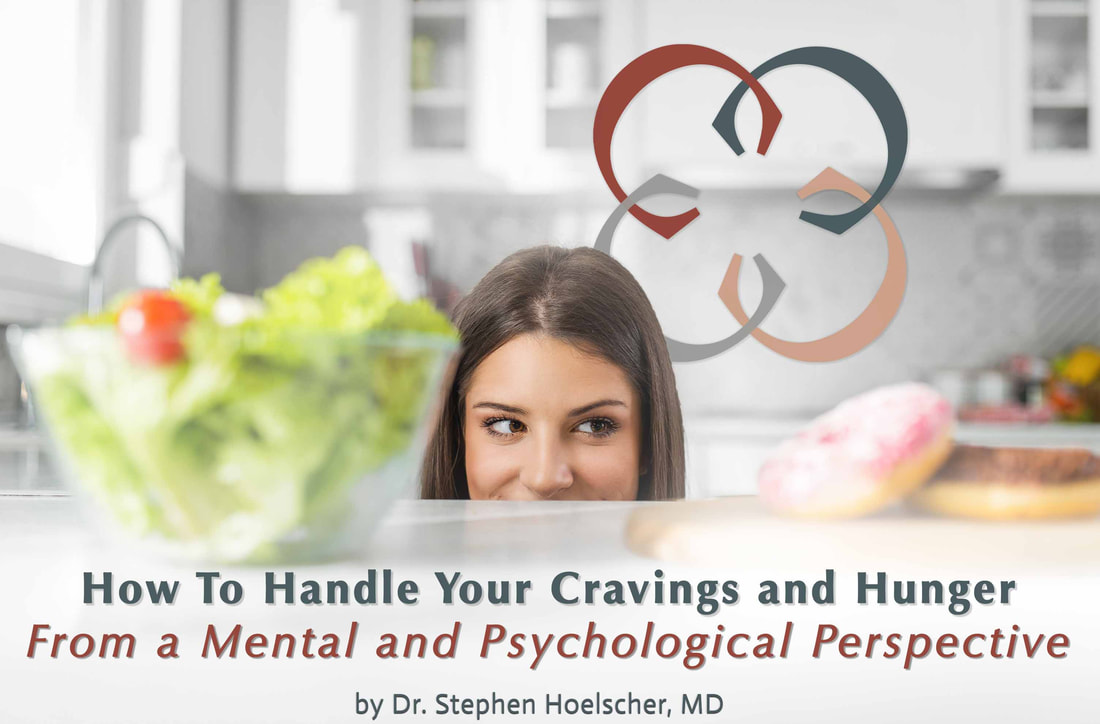|
7/14/2022 How to handle your cravings and hunger from a mental and psychological perspective - by Dr. Stephen Hoelscher, MDRead NowMost of us know what we need to do when it comes to losing weight and maintaining a healthy diet. We have been taught about what foods are healthy and what foods are not. It is so simple right? Just avoid the sweets and eat as much vegetables and fruit! Knowing one thing and actually doing that thing are two different things though. The key to changing one’s unhealthy food habits comes down to strengthening one’s will. The human being is a composite of body and soul. The latter is composed of an intellect and will which are immaterial like the soul. We have the unique ability amongst living creatures on Earth to self-reflect and make changes based on something we know is good or bad for us. This good or bad is beyond the physical realm as even animals know what physical goods and evils they need to consider for their own well-being. As obvious as there are physical laws that all creatures must follow to achieve physical goods, humans also have to consider what is immaterially good for us as well in order to achieve spiritual goods since we are both soul and body.
I will try to illustrate basically how the mind works when making a choice of what to eat or drink. The intellect thinks about a particular good and presents it to the will as good and then the will wills it in an absolute sense. This means that the will is always aimed toward good and so it “wishes” for the good in general. For example, resting because I’m tired is willed because it is good for me. Eating ice-cream because it makes me feel good in the moment and numbs my stress is seen as good for oneself (this latter example is an instance of the intellect being misinformed or “convinced” by both the will and bodily appetite that eating ice cream is a greater good than not eating it so the intellect misjudges what is actually good here but the will is still moved toward a perceived good). Next, the intellect judges this good’s attainability, and if it is attainable, it presents this good to the will as attainable and then the will may intend to obtain it. An example will illustrate this: if someone knows a healthy weight is good for them, they will want to be at a healthy weight (wish for it). Next the person immediately considers if this is attainable, and for most people, it is so they intend to consider the means of how to achieve this healthy weight (diet plan, exercise, etc). This is in contrast to those who wish to be at a healthy weight but do not intend toward that good because they do NOT see it as attainable for whatever reason and thus do not consider the means to attain it. This is a very important first step in understanding the human psyche around not only food, but goods in general. Some things are reasonable to not intend. For instance, a person may look up at the stars and wish to go to outer space (wills or wishes to go) but his intellect informs him that this is not attainable since he does not have the possible means to go to space and so he does not intend to go to space and does not even consider the means since he is not intending to go. That is a reasonable conclusion, at least for the vast majority of us. However, people can also unreasonably draw this conclusion as well. This is a common thing I see amongst people with regards to weight loss. They believe that it is not attainable for them to actually achieve a healthy weight and so they do not intend to lose weight and thereby do not consider the means to lose weight. This usually is due to an attachment to certain unhealthy foods that they are at that time unwilling to let go of. But there are other reasons too like expenses (healthier food sadly does tend to cost more which I find to be wrong) or not knowing information about what is healthy for you and what is not (thereby the intellect cannot present this good information to the will). It also applies to those who initially considered the means to lose weight and made an effort but for whatever reason did not achieve their goal and have fallen into a state of thinking that it is not attainable for them. Strengthening one’s will is what I want readers of this blog to focus on. And by strengthening your will, I mean that one needs to perform (or will) acts that they know are good for them thus allowing the intellect to move the will and preventing your appetites moving your will instead. An example of this is someone telling me “I just like ice-cream too much.” Here, the human mind sees the good of tasting and enjoying ice-cream outweighing (no pun intended) the good of eating healthier to lose weight which means your will is essentially more controlled by your bodily appetite than your intellect. The misdirected will then moves the intellect to be convinced it is good so one caves to eating ice cream. This of course needs to be avoided which is easy for me to tell you all but to practice it can be very difficult. The fact that it is difficult to practice shows us that human wills are generally weak and can become disordered more easily than we think. This is not to discourage you though! This is to tell you that by recognizing the truth of the matter, you will be led closer to finding the solution to it too! If one recognizes that one’s will is not as strong in choosing to eat healthier, then one can begin the process of getting those appetites and attachments to certain foods under control. This is not an easy process but nothing great is ever easy. To begin to strengthen your will, I suggest focusing on one or a few items at a time that you know are bad for your health. Let’s use standard ice-cream and chips for example. You can first ask yourself “are there alternative options that are like ice-cream or chips that are healthier and that I like?” If there are, do you wish and intend to change to eat them instead? Would your appetite really suffer from making such a switch to this alternative option(s)? If there are no realistic healthier substitutes that are like these, then are you willing to go down on the portion of these items each day or to go without them altogether? You can almost bet that your appetite will probably demand that you have them and that is where meditating on your knowledge of this matter now can come into play. You now know that your appetite is trying to overwhelm your will but you must let your intellect rule here and move the will to what you know is right. This way you can avoid the food and accept the suffering your body is going to get which is actually good for it (we’ll talk more on this in another blog). I also want you all to work on going over why is it you do not think you can lose weight if you do think this way. Write these down in a journal and meditate on them. Are these legit reasons? This will help your will to realize that it can wish for the good of a healthy weight and also be intentional to achieve that good. This may be to get you going in the first place where before you never seriously consider losing weight or it can be to get you back up on the horse where you “failed” before. By the way, I put “fail” in quotes because you may have failed with a certain specific dietary and exercise plan but it does not mean that you in general fail at losing weight or can’t do it. This is the kind of mentality that is not reasonable and is usually based in frustration from the overall process taking longer than one wants. This is just the start to understanding human psychology when it comes to weight loss! I will have more in the future where we will discuss other elements that relate to intellect and will power. For instance, we will go over the appetites of the body in more detail in general (not just appetite related to food). Over time I hope to try to tie everything together to give you all the best chance at being your best self!
0 Comments
Your comment will be posted after it is approved.
Leave a Reply. |
Blog Info
Archives
June 2024
Categories
All
|
|
Visit our Locations
IFM | West Des Moines 475 S. 50th St., Suite 600 West Des Moines, IA, 50265 *Temporarily Closed* IFM | Ankeny 207 NE Delaware Ave. Suite 20 Ankeny, IA 50021 |
Office HoursMonday 9:00 a.m. - 5:00 p.m. Tuesday 9:00 a.m. - 5:00 p.m. Wednesday 9:00 a.m. - 5:00 p.m. Thursday 9:00 a.m. - 5:00 p.m. Friday by appointment. Sat & Sun Closed |
© 2024 Integrative Family Medicine of Iowa, PLLC.
All rights reserved.
All rights reserved.



 RSS Feed
RSS Feed

